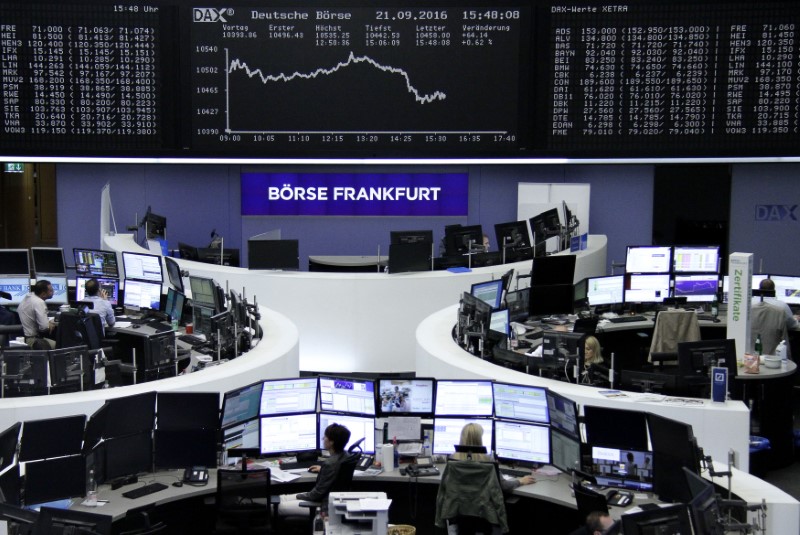By Richard Leong
NEW YORK (Reuters) - Stock prices around the world fell on Monday ahead of the first U.S. presidential debate between Hillary Clinton and Donald Trump, while oil prices rose in advance of an informal OPEC meeting in Algeria on hopes for an output cut.
Half of America's likely voters will rely on the presidential debates to help them make their choice between the two major U.S. party nominees in the Nov. 8 election, according to a Reuters/Ipsos poll released on Monday.
"Investors are acting extremely nervous with regards to the debate ... and it highlights the fact that the markets are not focusing on the health of the economy, interest rates and geopolitical events," said Robert Pavlik, chief market strategist at Boston Private Wealth.
In afternoon trading, the Dow Jones industrial average (DJI) was 157.86 points, or 0.86 percent, lower at 18,103.59, the S&P 500 (SPX) was down 17.59 points, or 0.81 percent, to 2,147.1 and the Nasdaq Composite (IXIC) was 47.23 points, or 0.89 percent, lower to 5,258.51.
European stocks fell, dragged down by a pullback in the shares of major banking and energy companies. Deutsche Bank shares (DE:DBKGn) hit a record low on worries about Germany's biggest lender in the wake of a massive $14 billion demand from the U.S. Department of Justice to settle claims on bad mortgage-backed securities.
Europe's broad FTSEurofirst 300 index (FTEU3) closed at 1,338.26, down 1.6 percent for its worst one-day loss since July 6.
Japan's Nikkei stock index (N225) ended 1.3 percent lower.
The MSCI world equity index (MIWD00000PUS), which tracks shares in 45 nations, fell 3.8 points, or 0.9 percent, to 416.20.
Oil prices rebounded after Algeria's energy minister said on Sunday that all options were possible for an output cut or freeze at this week's informal meeting of OPEC producers.
Brent crude (LCOc1) was last up $1.57, or up 3.42 percent, at $47.46 a barrel. U.S. crude (CLc1) was last up $1.62, or up 3.64 percent, at $46.1 per barrel.
YEN STRENGTHENS
Bank of Japan Governor Hiruhiko Kuroda said Monday the central bank would use all tools necessary to get inflation back to its 2-percent target, but his remarks did little to shift a conviction among bank analysts that the Bank of Japan is increasingly unable to weaken the yen.
The dollar shed almost 0.7 percent to 100.30 yen
The greenback has fallen since the U.S. Federal Reserve's downgrade of its economic outlook last week. It also hinted it is in no rush to raise U.S. interest rates although it left the door open for a possible hike in December.
Bets on a gradual pace of U.S. rate increases, together with jitters about the outcome of the U.S. presidential election in about seven weeks, underpinned demand for U.S. and German government debt, sending their 10-year yields to their lowest in over two weeks.
U.S. 10-year Treasury note yield (US10YT=RR) slipped over 3 basis points at 1.579 percent, while the German 10-year yields fell 2 basis points to minus 0.10 percent

Spot gold prices